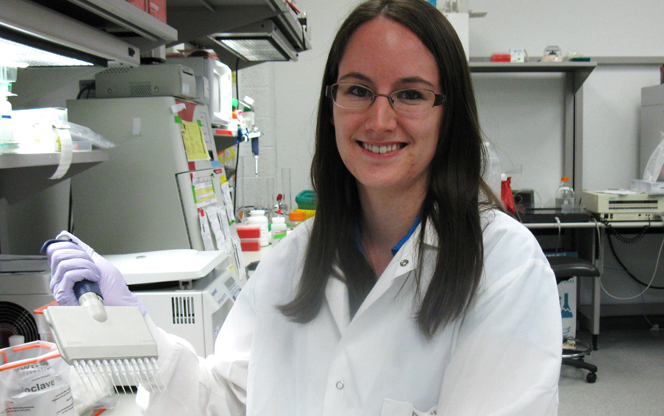As if the story of breakthrough research were not enough, there is the story of the researcher.
The accomplishment, in this case, is a rapid test for detecting devastating bacterial infections. The researcher is undergraduate pre-med student Kristin Wiggins, finishing her junior year at Northern Arizona University while working as an intern at Translational Genomics Research Institute North in Flagstaff.
At the heart of the story is someone who wants to make a difference in the world by saving people’s lives—a motivation rooted in instinct and a family tradition of public service and health care.
“I have always been fascinated with biology and I’ve had a lot of exposure to people in the medical and science professions,” said Wiggins, whose great-uncle was a pharmacogenomics researcher and father was a firefighter. “All of my experiences with them have affirmed my passion to help others with science and medicine.”
From the age of 16, Wiggins has applied her passion by getting into the lab and going to work. As a junior in high school, she received a Helios Internship that placed her in the Cancer and Cell Biology Division of TGen in Phoenix.
“I worked in the Brain Tumor Unit on Medulloblastoma and I absolutely loved it,” Wiggins said. The summer internship stoked her passion for research. After her freshman year at NAU, she contacted TGen North and was invited to interview, which resulted in an internship in the Center for Public Health and Clinical Pathogens.
“Pathogen research is extremely different from cancer research,” Wiggins said. “I was really excited to be offered the opportunity to participate in the revolutionary pathogen research that goes on every day at TGen North.”
Wiggins explained that her research group handles six different dangerous agents. “We work with pathogens that are locally relevant but have a global impact,” she said.
One of those pathogens, Klebsiella pneumonia, is emerging worldwide as a public health crisis, Wiggins said. The pathogen’s resistance to antibiotics fuels its danger as a secondary infection in hospital environments. The ability to identify it quickly—in a process known as a rapid KPC test—can save lives. Still experimental, the rapid test can accomplish in 90 minutes what now takes physicians two–three days.
In the lab, Wiggins’ role was to grow Klebsiella isolates and extract their DNA for validation purposes. The task involved extreme repetition in the pursuit of virtual perfection. “It is an amazing experience seeing the research process from beginning to end, and all the hard work in between,” Wiggins said. “I am thrilled that as an undergraduate intern, I can play a role in every single one of these steps.”
It’s a role that has gotten noticed. According to David Engelthaler, director of programs and operations at TGen North, “Kristin is the exact model of what we hope to see in our interns—someone who has immediate dedication to making herself a better and smarter researcher, so she can achieve her long term vision of making a difference in the world.”
Wiggins said the research group hopes to begin publishing papers on its findings soon. “I think that after some more validation and research, we can start translating this into the clinic so that doctors can start using it to diagnose their patients,” she said. “Physicians could start using our assay to shorten detection time, reduce the risk of false positives and enable improved treatment.”
While continuing the internship and the research project, Wiggins plans to finish her biomedical science major, with minors in chemistry, philosophy and mathematics. Then she intends to become a full-time research associate at TGen North while pursuing a master’s degree and possibly even a Ph.D. before turning to a medical career.
“One of the things that has surprised me the most is how much of an impact we have,” Wiggins said. “We do not do research for the sake of research. Our mission is to advance public health and clinical medicine, and we strive for this every single day.”



